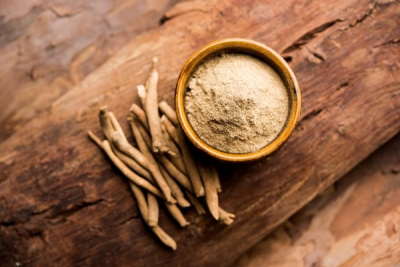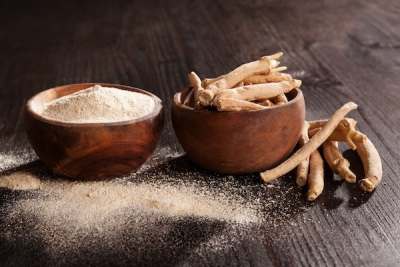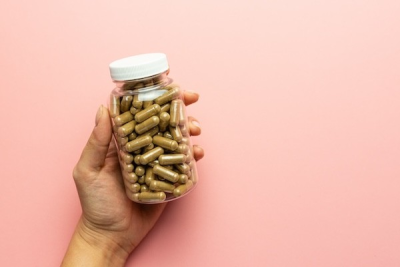Ashwagandha and its effects – Discover the dream herb!
Author: Lucie Garabasova
Ashwagandha, also known as Indian ginseng, is an herb with a long history in traditional Indian medicine known as Ayurvedic medicine. This plant is becoming increasingly popular due to its diverse therapeutic benefits and its ability to support overall well-being. Discover this dream herb for yourself!
What are the effects of ashwagandha?
- Reduction of stress and anxiety – It has been shown that daily doses of 225-600 mg over a period of 1-2 months significantly reduce cortisol levels (a scientific study is available HERE).
- Support for healthy sleep – A dose of over 600 mg daily for more than 8 weeks showed improved sleep quality in a study involving 400 participants.
- No side effects have been reported. Check out the full study.
- Boosting immunity – This study shows that 12 milliliters (ml) of ashwagandha root extract daily can increase the levels of immune cells (16Trusted Source).
- Enhancing memory – In a smaller eight-week study, taking 300 mg of ashwagandha root extract twice a day significantly improved overall memory, attention, and task performance compared to a placebo.
- Supporting vitality and energy – A 16-week study examined the effects of ashwagandha on fatigue, vitality, and steroid hormones in aging men. Overweight men aged 40-70, with mild fatigue, took either a placebo or ashwagandha extract for 8 weeks. It was concluded that taking standardized ashwagandha extract for 8 weeks was associated with an increase in DHEA-S and testosterone levels.
- Reducing inflammation – Preclinical studies have demonstrated this plant's ability to regulate mitochondrial function and apoptosis, reducing inflammation by inhibiting inflammatory markers such as cytokines (including IL-6 and TNF-a), nitric oxide, and reactive oxygen species.
- Fertility support – In a 2010 study of 75 men suffering from infertility, 5 grams of ashwagandha daily increased sperm count and motility over a period of 3 months.
- Regulation of blood sugar and cholesterol levels – In a 2013 study of 25 people, ashwagandha reduced fasting blood sugar levels three times more than the placebo after 4 weeks.
What is the recommended daily dosage of ashwagandha?
The recommended dosage of ashwagandha is highly individual (similar to CBD dosing), but most research suggests that taking 250-500 milligrams (mg) daily for at least one month can be beneficial. For long-term health effects, ashwagandha can be taken continuously for up to a year.
When should you take ashwagandha?
It depends on why you are using it. You can take ashwagandha in the morning to support energy and vitality throughout the day. If you struggle with insomnia, it's better to take it in the evening (30-60 minutes before bedtime).
If you're taking ashwagandha for other reasons besides energy, vitality, or improved sleep quality, we recommend taking it at any time during the day.
Side effects of ashwagandha
Although ashwagandha is generally considered a safe herb with minimal side effects, it's important to be cautious and aware of possible reactions, especially when taking higher doses or combining it with other medications.
If you experience diarrhea, constipation, bloating, or even an allergic reaction (itching), stop using ashwagandha.
Do not use ashwagandha during pregnancy!
Combining Medications and Ashwagandha
It's generally not recommended to combine ashwagandha with certain medications:
- Immunosuppressive medications: Ashwagandha can boost immune system activity. Some medications, such as those used after organ transplants, reduce immune system activity. Taking ashwagandha with these medications could reduce their effectiveness.
- Sedative medications (benzodiazepines): Ashwagandha may cause drowsiness and slow breathing. Some sedative medications also cause drowsiness and slowed breathing. Combining ashwagandha with sedatives may lead to breathing issues and/or excessive drowsiness.
- Thyroid hormone interaction: The body naturally produces thyroid hormones. Ashwagandha may increase the amount of thyroid hormones your body produces. Taking it with thyroid hormone pills could lead to excessive thyroid hormone levels and increase their effects and side effects.
- Diabetes medications (antidiabetics): Ashwagandha can lower blood sugar levels. Taking ashwagandha with diabetes medications could cause blood sugar levels to drop too low. Therefore, closely monitor your blood sugar levels if using them together.
If you are taking other medications, we recommend consulting your doctor before including ashwagandha supplements.
How long does it take for ashwagandha to show effects?
The time required for ashwagandha to take effect can vary from person to person and depends on several factors:
- Dosage: Higher doses of ashwagandha may work faster than lower doses. However, it's important to stick to the recommended dosage and avoid increasing it too quickly to prevent possible side effects (this is similar to how CBD product dosages work, as mentioned in this article).
- Form of consumption: Different forms of ashwagandha (e.g., extract, powder, tincture) may vary in how quickly they take effect. For example, ashwagandha powder mixed with water and swallowed may work faster than extract capsules, which need to pass through the digestive system first.
- Individual differences: Each person may react to ashwagandha differently, depending on their unique biology, health condition, and sensitivity to substances.
In general, some people may start to feel the positive effects of ashwagandha relatively quickly, sometimes after just a few days of regular use. These effects may include increased energy, better mood, reduced anxiety, or improved sleep. However, for maximum effect and long-term benefits, regular, long-term use of ashwagandha is typically required, usually over several weeks to months.
How to best use ashwagandha?
Ashwagandha is available in various forms, so it's important to choose the method that best suits your needs and preferences.
Here are several ways to use ashwagandha effectively:
- Capsules or Tablets: One of the simplest forms of taking ashwagandha is through capsules or tablets containing ashwagandha extract.
- Powder: Ashwagandha powder is another popular option. It can be mixed with water, milk, juice, or added to smoothies. The powder can also be used in recipes such as porridge, shakes, or baking.
- Tincture: Ashwagandha tincture is an extract dissolved in alcohol. It is usually applied using a dropper, allowing for precise dosage. Tinctures can be taken alone or mixed with water or juice.
- Tea: Ashwagandha tea is another option. There are pre-made ashwagandha tea bags, or you can make tea from ashwagandha powder or dried roots. Just pour boiling water over it and let it steep for a few minutes.
- Combination with Other Herbs: Some people prefer to combine ashwagandha with other herbs or supplements for synergistic effects. In this case, it's important to consult with a professional who can provide appropriate recommendations and information on potential interactions.
- Ashwagandha Spray: This is a relatively new option but shows very quick effects, especially for anxiety or stress.
Combining CBD and Ashwagandha: What can it offer?
Combining ashwagandha and CBD (cannabidiol) is an intriguing combination that may offer several health benefits. Both ashwagandha and CBD are known for their adaptogenic properties and ability to support well-being and balance in the body.
Together, they can:
- Stress and Anxiety: Both ashwagandha and CBD are known for their stress and anxiety-reducing effects. Combining these substances may enhance their effects, supporting a calmer mind and reduced stress response.
- Sleep: Reducing anxiety and stress can lead to better sleep. Studies suggest that both ashwagandha and CBD can help improve sleep quality and promote healthy sleep without insomnia symptoms.
- Muscle Recovery: For athletes and active individuals, the combination of ashwagandha and CBD may support faster muscle recovery after intense physical activity, leading to quicker recovery and reduced post-workout soreness.
- Immune System: Both ashwagandha and CBD have immunomodulatory properties, meaning they may help strengthen the immune system and protect the body against infections and diseases.
- Inflammation: Both natural substances have anti-inflammatory properties, which can be beneficial for those suffering from chronic inflammation or inflammatory conditions like arthritis.
Who should avoid ashwagandha?
While ashwagandha is generally considered safe and well-tolerated, there are certain groups of people for whom its use may not be appropriate or should be approached with caution:
- Pregnant and breastfeeding women: The safety of ashwagandha during pregnancy and breastfeeding has not been thoroughly studied. It is recommended that pregnant and breastfeeding women consult their doctor before starting ashwagandha.
- Children: The safety and efficacy of ashwagandha in children have not been well-studied. Parents should consult a pediatrician before giving ashwagandha to their children.
- People with autoimmune diseases: Ashwagandha may have immunostimulatory effects, which could be problematic for people with autoimmune diseases such as rheumatoid arthritis, lupus, or Crohn's disease. In such cases, consulting a doctor is advisable.
- People sensitive to certain components of ashwagandha: Although allergic reactions to ashwagandha are rare, some individuals may be sensitive to certain components of the herb. If you have known allergies to members of the Solanaceae family (e.g., potatoes, tomatoes), you should avoid ashwagandha or consult a doctor before use.
It is important to emphasize that ashwagandha is not a universal remedy and should be used with moderation and under professional guidance, especially if you have any health issues or are taking medications. However, for most people, ashwagandha can be a great natural supplement that helps manage stress, improve sleep, and support overall vitality.
Given the growing interest in natural healing methods and wellness, ashwagandha's popularity is expected to continue rising. It is a welcome alternative for those seeking a natural path to better health and well-being. If you're curious about its effects, it might be time to discover the wonders of this ancient herb.



